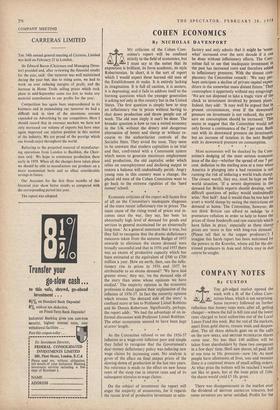COHEN ECONOMICS
By NICHOLAS DAVENPORT
MY criticism of the Cohen Com- mittee's report will be confined strictly to the field of economics, but I must say at the outset that its exposition is brilliant, its form academic, its style Robertsonian. In short, it is the sort of report which I would expect three learned old men of the Establishment to make. It is entirely lacking in imagination. It is full of caution, it is austere, it is depressing; and it fails to address itself to the burning questions which the younger generation is asking not only in this country but in the United States. The first question is simply how to stop an inflationary rise in prices without having to shut down production and throw people out of work. The old men imply it can't be done. The broader question is how to run a mixed economy in the UK without the dreary and dangerous alternation of boom and slump or without re- course to the authoritarian controls of the Socialist State. They avoid the issue. They seem to be unaware that modern capitalism is on trial and that, confronted with a Communist system which seems to generate maximum employment and production, the old capitalist order which relies on unemployment and declining output to restore a balance will undoubtedly perish. Angry young men in this country want a change; the placid old men of the Cohen Committee want to go back to the extreme rigidities of the 'hard money' school.
Economic criticism of the report will fasten first of all on the Committee's inadequate diagnosis of the more recent inflationary rise in prices. The main cause of the rising trend of prices and in- comes since the war, they say, has been 'an abnormally high level of demand for goods and services in general maintained for an abnormally long time.' As a general statement that is true, but they fail to recognise that the drastic deflationary measures taken from the autumn Budget of 1955 onwards to eliminate the excess demand were broadly successful and that in 1956 and 1957 there was an excess of productive capacity which has been estimated at the equivalent of £500 to £700 million a year. How on earth, then, can the infla- tionary rise in prices in 1956. and 1957 be attributable to an excess demand? 'We have laid greater stress,' they say, 'on the demand side of the story than some whose opinions we have studied.' The majority opinion in the economic profession is dead against their explanation of the inflation of 1956-57. In fact the minority opinion which stresses 'the demand side of the story' is confined more or less to Professor LiOnel Robbins and Sir Dennis Robertson. Significantly, perhaps, the report adds : 'We had the advantage of an in- formal discussion'with Professor Lionel Robbins.' The other economists seemed to have been kept at arms' length.
* * *
As the Committee refused to see the 1956-57 inflation as a wage-cost inflation pure and simple they failed to recognise that the Government's dear-money deflationary policy was inducing new wage claims by increasing costs. No analysis is given of the effect on final output prices of the slowing-down of production in the last two years. No reference is made to the effect on new house rents of the steep rise in interest rates and of its subsequent stimulus to wage claims.
* * *
On the subject of investment the report will anger the majority of economists, for it regards the recent level of productive investment as satis- factory and only admits that it might be 'some- what' increased over the next decade if it can be done without inflationary effects. The Com- mittee fail to see that inadequate investment in the past has increased costs and therefore added to inflationary pressures. With the utmost com- placency the Committee remark : 'We may per- haps anticipate a decline of private capital expen- diture in the somewhat more distant future.' They contemplate it apparently without any misgivings. `We are not disposed to take a tragic view of the, check to investment involved by present plans.' Indeed, they add : 'It may well be argued that in present circumstances, even if the downward pressure on investment is not reduced, the pres- sure on consumption should be increased.' This seems to suggest that the Committee would not only favour a continuance of the 7 per cent. Bank rate with its downward pressure on investment, but an increase of taxation in the next Budget with its downward pressure on consumption.
Most economists will be shocked by the Com- mittee's dodging of the most serious economic issue of the day—whether the spread of our 7 per cent. deflation to the sterling area at a time when America is plunging into a bad recession is not running the risk of inducing a world trade slump. The closest watch, they say, must be kept on the world situation. 'If a severe depression in the demand for British exports should develop, very difficult questions of policy would undoubtedly arise.' Not half! And it would then be too late to avert a world slump by easing the restrictions on demand at home. The Committee, however, do not think Britain can afford to indulge 'in a premature reflation in order to help to boost the prices of those foodstuffs and raw materials which have fallen in price,' especially as these slump prices are 'more in line with long-run demand.' (Please tell that to the copper producers!) I imagine this harsh report has been welcomed by the powers in the Kremlin, whose aid for the dis- tressed producers in Asia and Africa may in due course be sought.


































 Previous page
Previous page